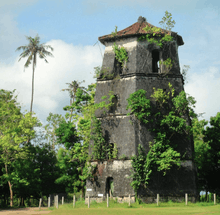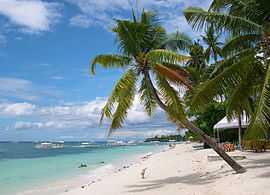Panglao, Bohol
| Panglao | |
|---|---|
| Municipality | |
 | |
 | |
.svg.png) Panglao | |
| Coordinates: 09°35′N 123°45′E / 9.583°N 123.750°ECoordinates: 09°35′N 123°45′E / 9.583°N 123.750°E | |
| Country | Philippines |
| Region | Central Visayas (Region VII) |
| Province | Bohol |
| District | 1st district of Bohol |
| Formed | 1803 |
| Barangays | 10 |
| Government[1] | |
| • Mayor | Leonila P. Montero |
| Area[1] | |
| • Total | 55.37 km2 (21.38 sq mi) |
| Population (2010)[2] | |
| • Total | 28,603 |
| • Density | 520/km2 (1,300/sq mi) |
| Time zone | PST (UTC+8) |
| ZIP code | 6340 |
| Dialing code | 38 |
| Income class | 4th class |
| Website | www.panglao.gov.ph |
Panglao is a fourth class municipality in the province of Bohol, Philippines, 18 kilometres (11 mi) from Tagbilaran City. It is one of two municipalities that make up Panglao Island (the other being Dauis), and its territory includes the 3 smaller islands of Balicasag, Gak-ang, and Pontod (or Pungtud, also known as Virgin Island).[1] According to the 2010 census, it has a population of 28,603 people.[2] Panglao is known for its diving locations and tourist resorts.
The name Panglao may have come from its former name Panglawod, meaning "to the open sea",[3] or derived from the term panggaw, referring to a fishing implement used by locals.[1]
Panglao has educational institutions, including the San Agustin Academy (Panglao), Lourdes National High School, the Cristal-e College, and elementary schools located in every barangay (including the Panglao Central Elementary School).
There are no fresh water streams or lakes on the island, so for its drinking water, the municipality is dependent on wells and the Canhilbas Underground Spring.[1]
Barangays
Panglao is politically subdivided into 10 barangays:
- Bil-isan
- Bolod
- Danao (largest barangay)
- Doljo
- Libaong
- Looc
- Lourdes
- Poblacion
- Tangnan
- Tawala
History
Well before the Spanish colonization, the area was already long visited by Chinese and other Asian traders, as evidenced by archaeological finds of Tang, Song, and Ming Dynasty porcelain and trade wares.[1]
Panglao flourished during the rule of the Dapitan Kingdom. But raids by Moluccans and conquest by Ternate resulted in periods of depopulation when its population fled mostly to Panay and Mindanao, including Dapitan.[1]
During the Spanish rule, a Jesuit Mission Post was established, that in 1782 was formed into a parish, known as La Iglesia de San Agustin de Panglawod. In 1803, the town was officially made into a municipality.[3]
The Panglao watchtower was built in 1851. The 5-story octagonal tower is reputedly the tallest of its kind in the Philippines but suffers from neglect.[3]
Demographics
| Population census of Panglao | ||
|---|---|---|
| Year | Pop. | ±% p.a. |
| 1990 | 17,004 | — |
| 1995 | 18,095 | +1.25% |
| 2000 | 21,337 | +3.35% |
| 2007 | 25,558 | +2.61% |
| 2010 | 28,603 | +3.82% |
| Source: National Statistics Office[2][4] | ||
Tourism
The primary tourist attraction of Panglao are its white sandy beaches, of which Alona Beach is the most famous and most developed. Alona Beach is about 1.5 kilometres (1 mi) long, lined with palm trees. resorts, and shops.[5] But recently it has drawn criticism from Panglao's mayor Benedicto Alcala for its unrestrained development that ignored municipal development policies, warning against overcrowding and Alona to lose its paradise-like image.[6] Other beaches include Bagobo, Bolod, Danao, Doljo, and Momo Beaches.
Panglao is renowned for snorkeling and dive sites such as Doljo Beach, Garden Eels, Arco Point, Kalipayan, Napaling, and Puntod. The island's southern portion is ringed with reefs that are relatively narrow and shallow (5 to 6 metres (16 to 20 ft)) with submarine cliffs plunging to depths of 33 to 56 metres (108 to 184 ft).[7] Tours can also be arranged to farther dive sites, including Balicasag and Pamilacan Islands.
Images
-

Playing basketball in Panglao, Bohol
-

Panglao watchtower
-
.jpg)
Panglao Island Nature Resort
-

Alona Beach, Panglao, Bohol
References
- ↑ 1.0 1.1 1.2 1.3 1.4 1.5 1.6 "Municipal Profile". Municipality of Panglao. Retrieved 2012-09-05.
- ↑ 2.0 2.1 2.2 "Population and Annual Growth Rates by Province, City, and Municipality - Region VII - Central Visayas: 1990, 2000, and 2010". National Statistics Office.
- ↑ 3.0 3.1 3.2 "Bohol Panglao Island Travel Guide". Talibon, Bohol, Philippines: A1 Online Communication and Advertising Services. Retrieved 2012-09-06.
- ↑ National Statistics Office - Population and Annual Growth Rates by Province, City and Municipality: Central Visayas: 1995, 2000 and 2007
- ↑ "Alona Beach, Panglao Island". Talibon, Bohol, Philippines: A1 Online Communication and Advertising Services. Retrieved 2012-09-06.
- ↑ Angeline Valencia (August 15, 2012). "Mayor alcala warns Panglao may become as crowded as Boracay". Philstar. Retrieved 2012-09-06.
- ↑ "Panglao Island Diving". Talibon, Bohol, Philippines: A1 Online Communication and Advertising Services. Retrieved 2012-09-06.
External links
| Wikimedia Commons has media related to Panglao, Bohol. |
- Municipality of Panglao
- Philippine Standard Geographic Code
- Philippine Census Information
- Alona Beach Guide
 |
Cebu Strait | Dauis |  | |
| Cebu Strait | |
Bohol Sea | ||
| ||||
| | ||||
| Bohol Sea |